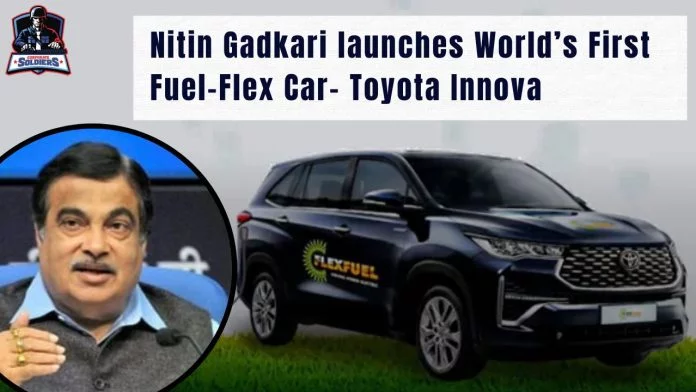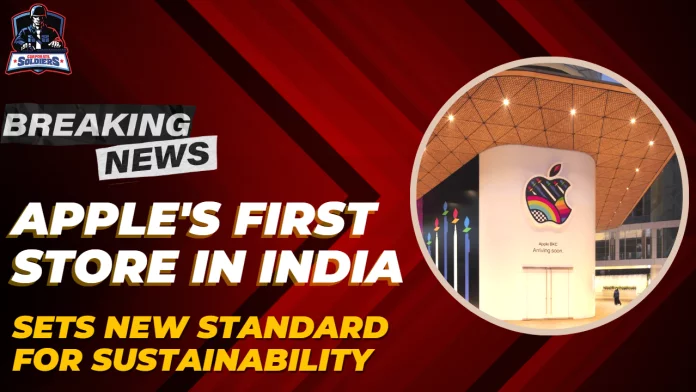The world’s first Bharat Stage (BS)-VI-compliant electrified flex-fuel car was recently launched by Union Minister of Road Transport and Highways Nitin Gadkari in a revolutionary step that promises to transform India’s agricultural economy and dramatically decrease carbon emissions. This cutting-edge car, created by Toyota Kirloskar Motor, automatically switches between electric and ethanol-powered modes to efficiently travel long distances. It runs on 100% ethanol (E100).
Driving Sustainability Through Innovation
The Toyota Innova HyCross-based prototype is a symbol of India’s dedication to environmentally friendly transportation. The fact that it can travel 40% of the route on ethanol and 60% on electricity while the petrol engine is off is one of its most impressive characteristics. This innovative strategy advances fuel economy while also cutting pollutants, making India’s efforts to address climate change more successful.
Empowering Farmers as ‘Urja Daata’
Beyond the car industry, this development is significant. Gadkari succinctly emphasised how the increased demand for ethanol, which is essential for blending with petrol and diesel, has the potential to change the face of Indian agriculture. Even though a sizable portion of the population relies on agriculture, just 12% of India’s GDP is generated by this industry. However, the ethanol sector might be a game-changer, transforming farmers into both ‘urja daata’ (energy suppliers) and ‘anna daata’ (food producers), in addition to making them ‘urja daata’ (energy providers).
A Catalyst for Economic Growth
It appears that Gadkari’s confidence in a more flourishing agricultural industry is well-founded. He imagines a future in which agricultural growth rates might increase from the present 12% to an astonishing 20% once the ethanol industry reaches Rs 2 trillion. The anticipated growth is consistent with the government’s goal of promoting environmentally and economically beneficial sustainable practises.
A Greener Tomorrow and Global Recognition
The introduction of the BS-VI compliant electric flex-fuel vehicle represents a victory for both India and the global automotive industry. Although there are flex-fuel cars all over the world, this one stands out because it complies with India’s strict BS-VI pollution requirements. It’s important to note that Toyota is committed to developing this technology and has goals to produce 100% ethanol-powered motorbikes, e-rickshaws, autorickshaws, and other vehicles in addition to passenger cars.
Accelerating Ethanol Blending for Energy Independence
Hardeep Singh Puri, the Union Minister for Petroleum and Natural Gas, emphasised India’s remarkable progress in ethanol blending. Compared to 2014, when ethanol made up only 1.53% of blends, it will make up about 11.5% of blends by March 2023. The country is currently aiming to reach an E20 blending rate of 20% by 2025, thereby lowering its dependency on fossil fuels and reducing carbon emissions.
Towards a Greener Future
Masakazu Yoshimura, managing director and chief executive officer of Toyota Kirloskar Motor, emphasised the firm’s dedication to a society where mobility is carbon-neutral. The core of their philosophy is the evaluation and adoption of cleaner technologies that are compatible with regional ecosystems, the state of the infrastructure, and customer preferences. With widespread access to E20 fuel at petrol stations and plans for nationwide supply by April 2025, India is well-positioned to reduce its import expenditure and replace a sizable portion of its petrol imports.
Conclusion: Paving the Way for Sustainable Mobility
The introduction of the electrified flex-fuel automobile that complies with BS-VI marks a turning point in India’s effort to develop sustainable modes of transportation. Beyond the world of automobiles, this innovation has the power to revive India’s agricultural industry, spur economic expansion, and move the country closer to a cleaner, greener future. As we observe this incredible development, it is clear that the fusion of sustainable practises and technology will serve as the engine for a more independent and environmentally conscious India.










